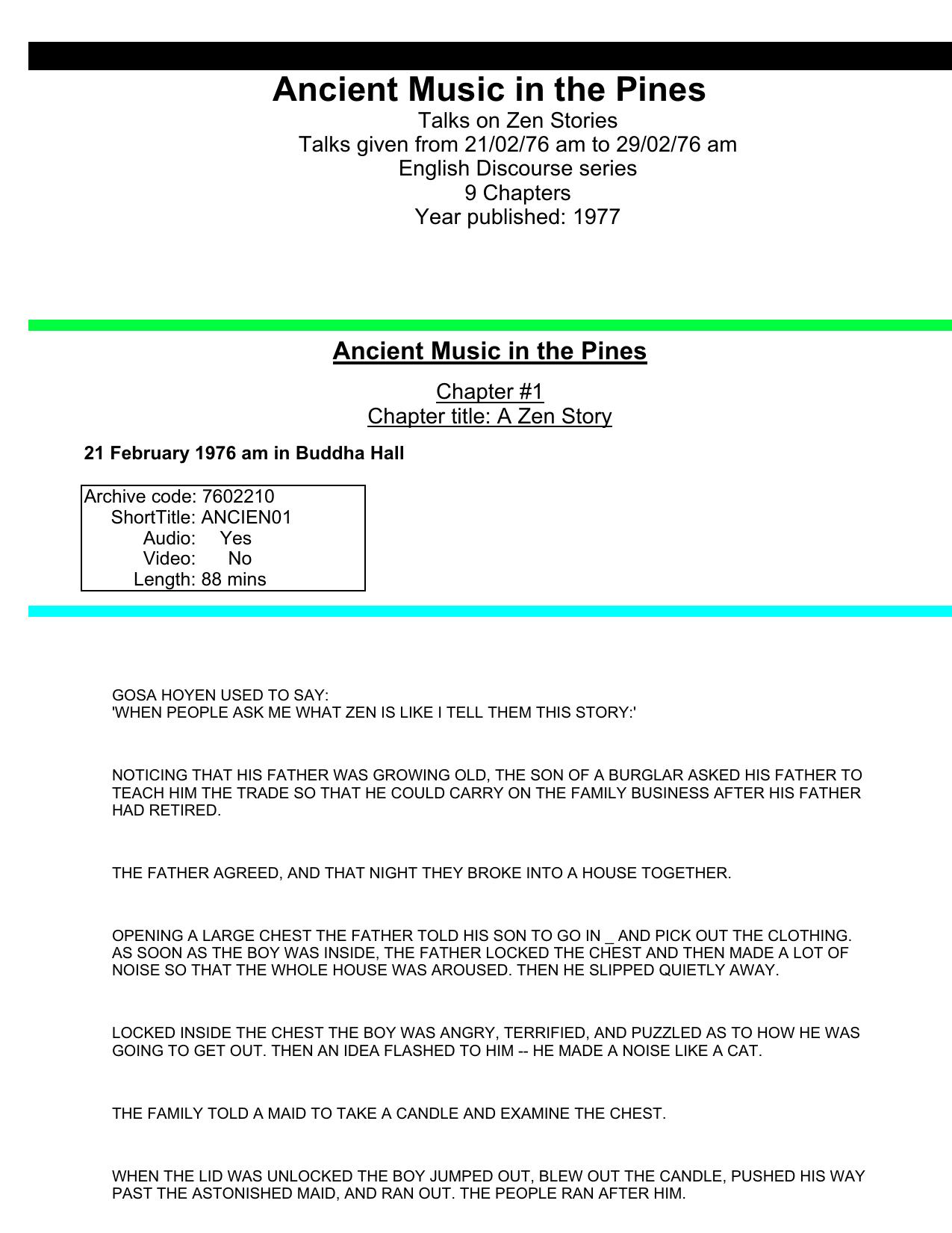Ancient Music in the Pines by Osho

Author:Osho
Language: eng
Format: mobi, pdf
Published: 2011-05-18T18:30:00+00:00
Chapter title: Madmen and Devotees
26 February 1976 am in Buddha Hall
Archive
code:
7602260
ShortTitle:
ANCIEN06
Audio:
Yes
Video: No
Length:
78
mins
The first question:
Question 1
WHAT'S THE DIFFERENCE BETWEEN A MADMAN AND A DEVOTEE?
Not much. And yet much. Both are mad but their madness has a totally different quality to it; the center of madness is different. The madman is mad from the head; the devotee is mad from the heart.
The madman is mad because of a failure. His logic failed He could not go on with the head anymore, any longer. There comes a point for the logical mind where breakdown is a must, because logic goes well up to a certain limit then suddenly it is no longer real, then it is no longer true to reality.
Life is illogical. It is wild. In life, contradictions are not contradictions but complementaries. Life does not believe in the division of either/or, life believes in both.
The day becomes night, the night becomes day. They melt and merge. Boundaries are not clear. Everything is overlapping everything else: you are overlapping into your beloved, your beloved is overlapping into you. Your child is still a part of you and yet he is independent. Boundaries are blurred.
Logic makes clear-cut boundaries. For clarity it dissects life into two, into a duality. Then clarity is achieved but aliveness is lost. At the cost Of aliveness, logic achieves clarity.
So if you are a mediocre mind, you may never go mad. That means you are just lukewarmly logical, and much that is illogical goes on existing in you side by side. But if you are really logical, then the ultimate result can be only madness. The more logical you are the more you will be intolerant of anything illogical. And life is illogical. So you will become by and by intolerant of life itself; you will become more and more closed. You will deny life, you will not deny logic. Then finally you break down -- this is the failure of logic.
Almost all the great philosophers who are logical, go mad. If they don't go mad, they are not great philosophers. Nietzsche went mad; Bertrand Russell never went mad He is not such a great philosopher, he is in a way mediocre. He goes on living with his commonsense -- he is a commonsensical philosopher, he does not move to the very extreme. Nietzsche moved to the very extreme and, of course, then There is the abyss.
Madness is the failure of the head and in life there are millions of situations where suddenly the head is irrelevant.
I was reading an anecdote.
A woman telephoned the builder of her new house to complain about the vibrations that shook the structure when a train passed by, three streets away.
'Ridiculous!' he told her. 'I will be along to check it.' 'Just wait until a train comes along,'
said the woman, when the builder arrived for his inspection. 'Why, it nearly shakes me out of bed. Just lie down there. You will see.'
The builder had just-stretched himself out on the bed, when the woman's husband came home.
Download
This site does not store any files on its server. We only index and link to content provided by other sites. Please contact the content providers to delete copyright contents if any and email us, we'll remove relevant links or contents immediately.
The Way of Zen by Alan W. Watts(6600)
Ego Is the Enemy by Ryan Holiday(5413)
The Art of Happiness by The Dalai Lama(4125)
The Book of Joy by Dalai Lama(3972)
Why Buddhism is True by Robert Wright(3446)
Spark Joy by Marie Kondo(3298)
Shift into Freedom by Loch Kelly(3192)
Happiness by Matthieu Ricard(3040)
A Monk's Guide to a Clean House and Mind by Shoukei Matsumoto(2902)
The Lost Art of Good Conversation by Sakyong Mipham(2641)
The Meaning of the Library by unknow(2564)
The Unfettered Mind: Writings from a Zen Master to a Master Swordsman by Takuan Soho(2302)
The Third Eye by T. Lobsang Rampa(2257)
Anthology by T J(2206)
Red Shambhala by Andrei Znamenski(2192)
The Diamond Cutter by Geshe Michael Roach(2058)
Thoughts Without A Thinker: Psychotherapy from a Buddhist Perspective by Epstein Mark(2011)
Twilight of Idols and Anti-Christ by Friedrich Nietzsche(1889)
Advice Not Given by Mark Epstein(1878)
